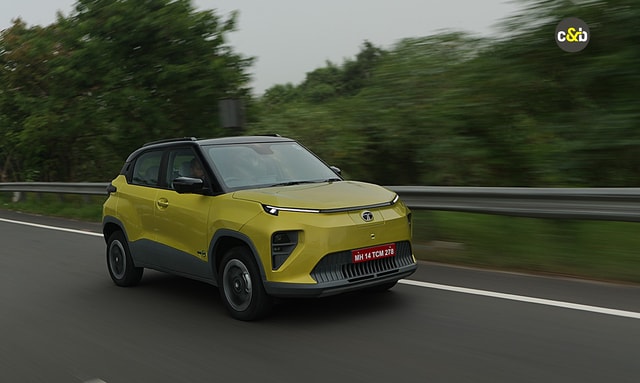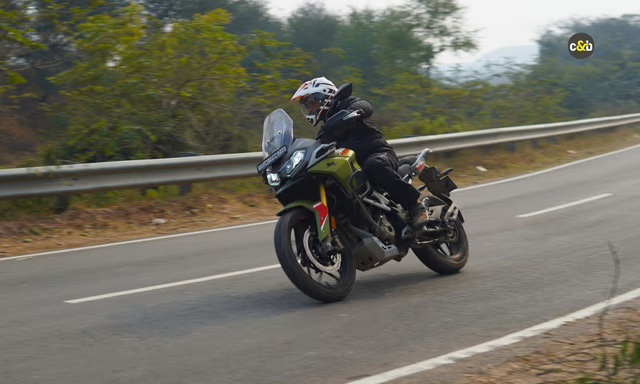Is It The End Of The Line For The Diesel Engine?

- Paris and Stuttgart have decided to ban diesel cars from their city
- The diesel engine has also been under threat in countries like India
- Volvo has decided to downsize to 4-cylinder engines across the board
On the sidelines of the Geneva Motor Show was a burning (literally) issue that seemed to be on the forefront of every discussion group and every round table conference. Is this the beginning of the end of the popularity of the diesel engine? Well, considering the fact that cities like Paris and Stuttgart (the home of automakers like Porsche or Mercedes-Benz who still have a very dominant diesel culture), have decided to ban diesel cars from their city centres in the foreseeable future, the threat seems very real. More cities globally seem to be following in a similar direction. The diesel engine has also been under threat in countries like India off late through the likes of the diesel ban in the Delhi region and a growing need to reduce urban emissions. Now although the diesel engine has never been the primary reason for urban pollution, particulate matter does play a major role when it comes to smog creation.
Volvo, a car maker that took the conscious decision to downsize to 4-cylinder engines across the board are a prime example of how smaller petrol engines with electrification added can compensate for both power and torque outputs and still be a cleaner solution for the environment. Volvo CEO Hakan Samulsson, has already stated that although the diesel engine will continue in the immediate future, all Volvo cars will get some sort of electrification by 2025. Volvo's first ever full electric car will actually be introduced in 2019 and unlike some other car makers, Volvo will go the Tesla way and introduce a conventional looking car with an all electric powertrain. These new Volvo cars will be based on the same current architecture, which will be adapted for electric vehicles, but eventually there will also be a modular platform with a more electric-only focus.
Nissan-Renault-Mitsubishi Alliance head Carlos Ghosn has also recently hinted that more and more automakers will ditch diesel engines across the board to opt instead for an electrified solution with a combination of a petrol engine.
But emissions alone will not be the final death of the diesel engine. Today, the diesel engine is used for one of two reasons. Firstly, the diesel engines offer a lot more fuel economy than most petrol motors of a similar displacement. And secondly, the torque ratings for diesel engines are far greater than petrol engines which means their commercial use is more predominant. Both these factors though can be easily achieved by a petrol powerplant which electric assist. The assist can be with the help of a series hybrid setup or a plug-in hybrid version. The plug in hybrid of course is the interim solution with a host of manufactures, from the mass market and premium segments introducing cars globally with this concept.
Countries like India though will be at a disadvantage when it comes to electrification. With no clear impetus on regulations for electric and hybrid cars in sight, the likes of the petrol and diesel engines will continue to rule the roost for the near future. With BS6 coming into play in 2020, the fuel quality and new emissions control technology will easily meet these regulations without the need for electrification. The bigger problem though is the sheer lack of infrastructure to support electric vehicles in India. And that is a change that can only be brought about by the government and cannot be expected to be implemented by one or a group of automotive manufacturers. So although the diesel engine might be a soon-to-be-extinct concept in the more developed parts of the world, India still has a long way to go.
Latest News
 car&bike Team | Mar 3, 2026Ducati Desmo450 MX Teased Ahead of India LaunchThe Ducati Desmo450 MX is expected to be launched in India soon, as early as sometime later in March 2026.3 mins read
car&bike Team | Mar 3, 2026Ducati Desmo450 MX Teased Ahead of India LaunchThe Ducati Desmo450 MX is expected to be launched in India soon, as early as sometime later in March 2026.3 mins read car&bike Team | Mar 3, 2026Is this the Vida VXZ Electric Motorcycle?A test mule of an almost production-ready electric motorcycle has led to speculation that it could be the upcoming Vida VXZ electric motorcycle.2 mins read
car&bike Team | Mar 3, 2026Is this the Vida VXZ Electric Motorcycle?A test mule of an almost production-ready electric motorcycle has led to speculation that it could be the upcoming Vida VXZ electric motorcycle.2 mins read Shams Raza Naqvi | Mar 3, 2026Vinfast Unveils Two New Ultra Luxury Models, Restructures Brand LinesThe Vietnamese car company has announced that its vehicles will fall in three brand lines with Lac Hong being the luxury brand.1 min read
Shams Raza Naqvi | Mar 3, 2026Vinfast Unveils Two New Ultra Luxury Models, Restructures Brand LinesThe Vietnamese car company has announced that its vehicles will fall in three brand lines with Lac Hong being the luxury brand.1 min read car&bike Team | Mar 3, 2026Raptee.HV T30 Electric Motorcycle Deliveries BeginThe Chennai-based start-up Raptee.HV has begun large-scale customer deliveries of the brand’s first electric motorcycle – the Raptee T30.1 min read
car&bike Team | Mar 3, 2026Raptee.HV T30 Electric Motorcycle Deliveries BeginThe Chennai-based start-up Raptee.HV has begun large-scale customer deliveries of the brand’s first electric motorcycle – the Raptee T30.1 min read Shams Raza Naqvi | Mar 3, 2026From Vitara Brezza To Brezza: Maruti’s Subcompact SUV Completes A Decade In The MarketThe SUV has seen a major switch from being just a Diesel model to being just a Petrol in the last few years.2 mins read
Shams Raza Naqvi | Mar 3, 2026From Vitara Brezza To Brezza: Maruti’s Subcompact SUV Completes A Decade In The MarketThe SUV has seen a major switch from being just a Diesel model to being just a Petrol in the last few years.2 mins read car&bike Team | Mar 2, 2026Yezdi Roadster Red Wolf Launched at Rs 2.10 LakhYezdi has expanded the Roadster line-up with a new Red Wolf colourway, now the most premium shade in the range.1 min read
car&bike Team | Mar 2, 2026Yezdi Roadster Red Wolf Launched at Rs 2.10 LakhYezdi has expanded the Roadster line-up with a new Red Wolf colourway, now the most premium shade in the range.1 min read
 Bilal Firfiray | Feb 28, 2026Tata Punch EV Facelift Review: More Range, More Sense, Less MoneyThe Tata Punch EV facelift gets a bigger 40 kWh battery, faster 60 kW DC charging, improved thermal management, and better real-world range, and all of that at a lower introductory price. But does it become a more complete package now?6 mins read
Bilal Firfiray | Feb 28, 2026Tata Punch EV Facelift Review: More Range, More Sense, Less MoneyThe Tata Punch EV facelift gets a bigger 40 kWh battery, faster 60 kW DC charging, improved thermal management, and better real-world range, and all of that at a lower introductory price. But does it become a more complete package now?6 mins read Preetam Bora | Feb 24, 2026Hero Destini 110 Review: Simplicity, RefinedThe Hero Destini 110 is a no-nonsense commuter that is simple, comfortable and above all, fuel efficient. In 2026, when buyers are spoilt for choice, is it good enough to consider?1 min read
Preetam Bora | Feb 24, 2026Hero Destini 110 Review: Simplicity, RefinedThe Hero Destini 110 is a no-nonsense commuter that is simple, comfortable and above all, fuel efficient. In 2026, when buyers are spoilt for choice, is it good enough to consider?1 min read Preetam Bora | Feb 23, 2026TVS Apache RTX Road Test Review: Redefining the Entry-Level ADVAfter spending some time with the TVS Apache RTX in traffic, the daily commute, as well as on open highways, one thing becomes clear: the RTX is trying to redefine the entry-level ADV segment. But is it without fault?1 min read
Preetam Bora | Feb 23, 2026TVS Apache RTX Road Test Review: Redefining the Entry-Level ADVAfter spending some time with the TVS Apache RTX in traffic, the daily commute, as well as on open highways, one thing becomes clear: the RTX is trying to redefine the entry-level ADV segment. But is it without fault?1 min read Girish Karkera | Feb 20, 2026Road Test: 2025 VinFast VF7 AWD Sky InfinityFlagship all-electric SUV from the Vietnamese car maker gets most of the basics right.1 min read
Girish Karkera | Feb 20, 2026Road Test: 2025 VinFast VF7 AWD Sky InfinityFlagship all-electric SUV from the Vietnamese car maker gets most of the basics right.1 min read Jaiveer Mehra | Feb 18, 2026New BMW X3 30 Vs Mercedes-Benz GLC 300: Midsize Luxury SUV FaceoffWith the new X3 30, BMW has a direct competitor to the petrol GLC 300, but which is the luxury SUV for you?1 min read
Jaiveer Mehra | Feb 18, 2026New BMW X3 30 Vs Mercedes-Benz GLC 300: Midsize Luxury SUV FaceoffWith the new X3 30, BMW has a direct competitor to the petrol GLC 300, but which is the luxury SUV for you?1 min read




























































































































